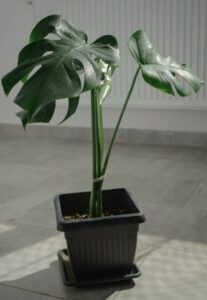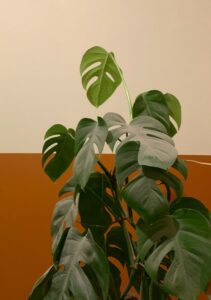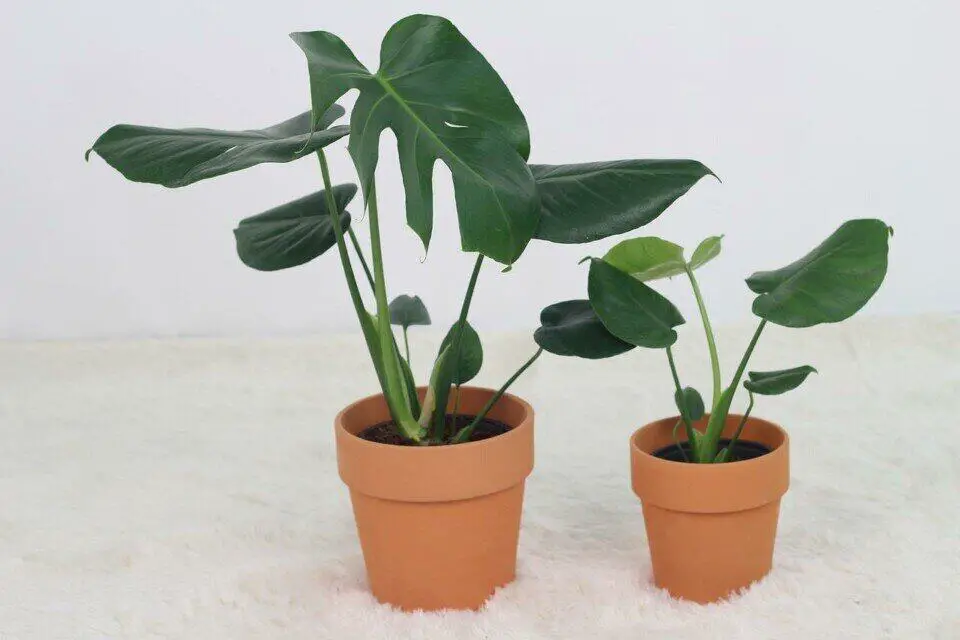Some links in the post are affiliate links and I get a commission from purchases made through some links found in the post.
Monstera deliciosa, the Swiss cheese plant is a species of a flowering plant indigenous to tropical forests of southern Mexico, south of Panama.
Growing in the temperate zones as a house plant, It is an easy-to-cultivate plant. Reaping it has several advantages because its fruit is rich in vitamins.
The plant is also useful during humid conditions. One point gardeners ponder upon is whether it can purify the air? Thankfully! This article has got answers to all of your questions so let’s find out!
The answer is a monstera can purify the air! Monstera is a go-to choice when cleaning the environment.
With lush green foliage, the Monstera plant is one of the top choices used by gardeners for purifying the surroundings.
In this age of urbanization when pollution is at its peak, plants provide us not only with a healthy domain to breathe in but also remove a lot of harmful carcinogens from the surroundings.
By doing this they make the atmosphere tolerable. Monstera is the houseplant you want to reap if you want to inspire in some natural breeze.
But this is not all. We have all the information you need for cleaning your environment while using a houseplant. So stick to this article if you want to reap some seeds and maintain your environment simultaneously!
Do Houseplants have the Potential to Purify the Air?
 A speckless and clear breeze is the need of the hour as it is necessary for maintaining a healthy lifestyle.
A speckless and clear breeze is the need of the hour as it is necessary for maintaining a healthy lifestyle.
According to the Environment Protection Agency (EPA), Americans spend 90% of their time indoors where there are 4 to 5 times more carcinogens than in the outer environment.
This tells us the importance of having fresh air to breathe in the vicinity of our households. But do houseplants have the potential to clean the air?
Can they be used in our homes to provide us with a better quality breeze? Well, scientists have divided opinions on this but the majority of them say that houseplants don’t make a significant difference when cleaning the environment.
Scientists over time have performed a lot of appraisals investigating the truthfulness of the claim that house plants do clean the surroundings.
One such study was published in the Journal of Exposure Science & Environmental Epidemiology.
Drexel University researchers Bryan Cummings and Michael Waring skimmed through all the previous studies about the effect of houseplants.
They analyzed 196 experiments from 12 previously based studies and concluded that houseplants don’t make much of a difference in essentially removing all the detrimental toxins.
Although houseplants do give off oxygen they have to be present in a large amount for them to make any difference in disinfecting the air.
Plants give off a lot of useful gases during photosynthesis. Not only this but they also absorb a lot of harmful gases in our habitat so we can say that they discard toxins from the environs to some extent but are they fruitful?
This is the major question and the answer is No! They are not that proficient and must be present in a large quantity for them to make any difference.
Why Might Houseplants not Purify the Air?
Although plants can rinse the air and do produce useful gases most the scientists have now gathered around to the conclusion that they are generally not very assistive in cleaning the environment.
They have termed the ability of the plant to purify the air a misnomer.
Although during the experiments conducted, houseplants of various kinds removed almost two-thirds of volatile organic compounds (VOC) but there were certain unavoidable limitations in that experiment.
Though plants removed two-thirds of the formaldehyde used in the container, Warring argued that the densely situated chambers in labs don’t mimic the conditions plants have to face in households.
Thus it cannot be used as a suitable parameter to judge a plant’s ability to purify the air in offices or households.
Moving on, Warring calculated the clean air delivery rate (CADR) for every houseplant. He compared the results with an average purifier.
Warring standardized the results of each study with a CADR and used it to find out how well plants remove toxins from the environment.
He concluded that plants do remove toxins they do so at such a slow rate that they cannot be used as an alternative to the air purifying mechanisms already being used in our locale.
To reduce VOCs enough to impact air quality would require around 10 plants per square foot. In a small 500-square-foot apartment, that’s 5,000 plants which are not feasible for planting at home.
Can a Monstera Purify the Air?
 Next up is the query you all want an answer to, can Monstera purify the air? A monstera can purify the air, but how effective are they? What are their qualities? Well, you’ll be knowing the answers to all of these reservations in a while.
Next up is the query you all want an answer to, can Monstera purify the air? A monstera can purify the air, but how effective are they? What are their qualities? Well, you’ll be knowing the answers to all of these reservations in a while.
The Monstera with its large leaves is ideal to purify the air. Leaves are good absorbers of toxins and the larger the surface area, the faster is the rate at which they can purify the air.
But leaf size is not the only attribute to look at while clearing the room because for Monstera to purify the air it has to be provided with some clear-cut conditions for them to work effectively. What are they?
For the Monstera to clear the room, they would have to be placed in a sealed room with no HVAC system. Scientist Bill Wolverton has made some important insights on this subject.
He suggests that you would need at least two large plants per one hundred square feet. That would mean you would have to have approximately twenty large houseplants to filter the air in one thousand-square-foot home.
Thus, one requires a very large number of houseplants for them to make any effect and this generally is not feasible in the vicinity of our households.
Monstera uses photosynthesis to clear the environment. But even with all of those luxuriant green leaves, they are not able to remove a considerable amount of carcinogens from the environment.
Therefore, we can conclude that although Monstera is a go-to choice when cleaning your surroundings.
But for them to be effective they must be available in bulk, which cannot be kept at home, unfortunately. They cannot be used as a substitute for ventilation systems for cleaning the air.
Does Monstera give Oxygen at Night?
Monstera has been known as an easy-to-cultivate houseplant. It does not need much care and maintenance.
For this reason, it has been preferred by people who want some sort of foliage in their households as it can easily be grown in pots.
Another aspect that is often undermined is the ability of this plant to clean the air. The profusely branching green leaves and their large size assist them in absorbing carcinogens and toxins. Thus they play a vital role in keeping the environment clean.
On top of that, this plant is especially known for giving off oxygen at night and this is consumed by humans to meet their respiratory needs. Production of oxygen is a major plus point because in this way it can be kept in bedrooms.
One does not have to worry about them while sleeping. The oxygen they produce can be inhaled by humans for breathing.
This ability of Monstera to give off oxygen makes it safe for use as a houseplant as well for keeping in bedrooms. Moreover, the oxygen provided by this plant is a valuable asset for humans because it helps to rinse the air.
A lot of toxins are present around us and oxygen makes it possible for us to breathe in such toxic conditions. This is the reason scientists usually encourage us to plant more trees because of their ability to absorb carcinogens and give off oxygen.
This helps purify the environment which is an important need when global warming and urbanization are at their all-time peak.
Such times demand that we should reap the maximum amount of foliage for the protection of our environment and humankind. Thus we can see why Monstera is a valuable asset in keeping our households tidy!
How does Monstera Compare to Other Houseplants when Purifying the Air?
 Generally considered a very good means of cleaning the air, one often asks this question how well does Monstera fare when compared to other plants for their air purifying quality.
Generally considered a very good means of cleaning the air, one often asks this question how well does Monstera fare when compared to other plants for their air purifying quality.
Well, although Monstera is considered a very effective cleaner of our habitat, certain other plants yield better results.
Let’s take a closer look at them and compare their abilities to the Swiss Cheese plant.
Spider plant
This mesmerizing, lush foliage of the spider plant can clean deleterious chemicals from the air. This beautiful plant is kill-proof and carries plantlets on the arching flower stem.
These can be used to grow new flowers. Moreover, it is also an effective cleaner of air. It had been suggested by scientists as a first-hand choice when picking plants for your household.
It can easily battle toxins including xylene and carbon monoxide. The cherry on top is that plant is non-toxic itself, so one doesn’t have to worry about keeping it in a safe place.
Snake plant
Also known as mother-in-law’s tongue, this beautiful, yellow-tipped succulent releases oxygen at night thus helping you breathe better while sleeping.
Furthermore, it is a known purifier of formaldehyde, xylene, benzene, toluene, and trichloroethylene. One can see the effect it has on the environment thus making it one of the best choices for growing indoors.
An easy-to-maintain plant that can grow up to a two-meter height, it doesn’t have any need for blooming. It can be grown by placing them at any point with appropriate light and watering it sparsely.
Other advantages include a positive effect on mental health, effective against allergies, and can help in minor ailments.
Chrysanthemums
Another one on the list is known for its exquisite air-purifying capabilities, they are a great addition to your flower arrangements.
Chrysanthemums are among the best air purifying house plants. They are a tad bit difficult to grow, but the results are beautiful colored blooms.
They enjoy good air flow, bright indirect sunlight, and watering with warm water only. Make sure that they are allowed to dry fully in between drinks.
Among the principal toxins it removes include ammonia, benzene, formaldehyde, and xylene. There are some precautions to keep in mind when deciding to buy mums as they are toxic to both cats and dogs
Furthermore, they bloom for only about 6 weeks. They lose their air-purifying ability without the flowers. One has to look at the complications before selecting them as their household foliage.
Thus one can see how different plants have different capabilities. You should also look at all the pros and cons before deciding on which plant to buy for one home.
Final Thoughts
 Monstera or Swiss-cheese plant is a species of houseplant grown in temperate zones. It has many valuable advantages. The most important one is its ability to cleanse the air. Houseplants are considered effective in cleaning the air.
Monstera or Swiss-cheese plant is a species of houseplant grown in temperate zones. It has many valuable advantages. The most important one is its ability to cleanse the air. Houseplants are considered effective in cleaning the air.
But this is a misnomer as various researches and articles tell you that, although they can purify the air and their leaves can absorb harmful toxins but they are not very effective in cleaning our surroundings.
This is because they must be present in a large quantity for them to have any effect. This is not feasible within the vicinity of our households.
One major benefit of growing Monstera is its ability to give off oxygen. This can be used for respiration, and it helps in keeping the environment neat and tidy.
Thus it helps in combating pollution. Furthermore, apart from Monstera, a lot of other plants are known for their purification abilities.
The best plants among the lot are Snake Plant, Spider plants, and Chrysanthemums among others. Thus, one must look at all the pros and cons before deciding which houseplant to procure for their homesteads.
About the Author:
Saad Ansar
Saad is an avid gardener himself and is a great lover of plants, animals, photography, & people. Currently, he is focused on photographing indoor plants & captioning beautiful outdoor sceneries. He writes and rewrites in-depth articles on nature and science.


